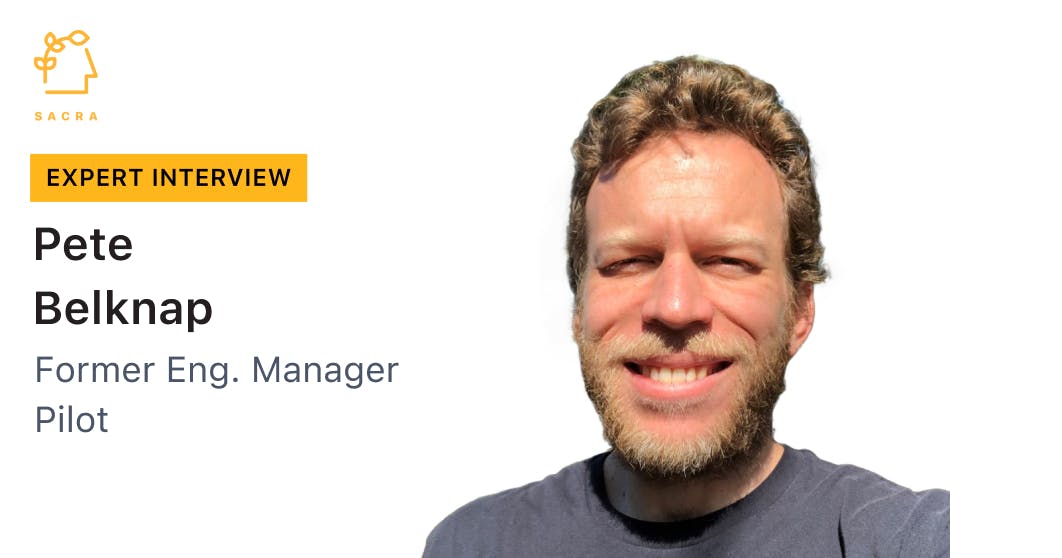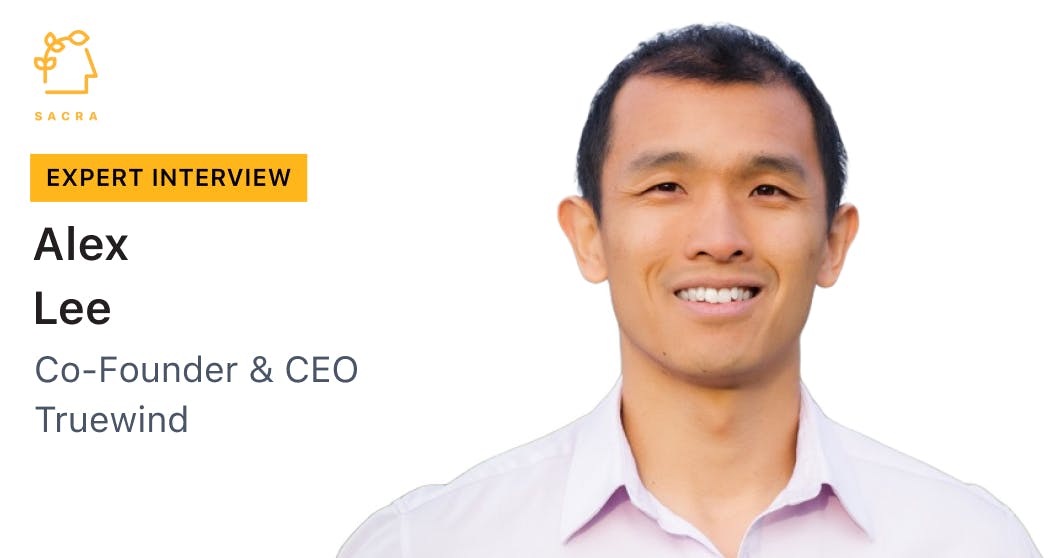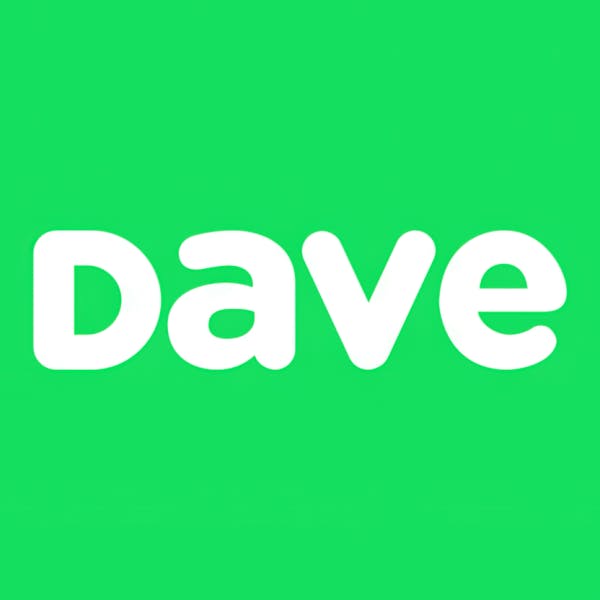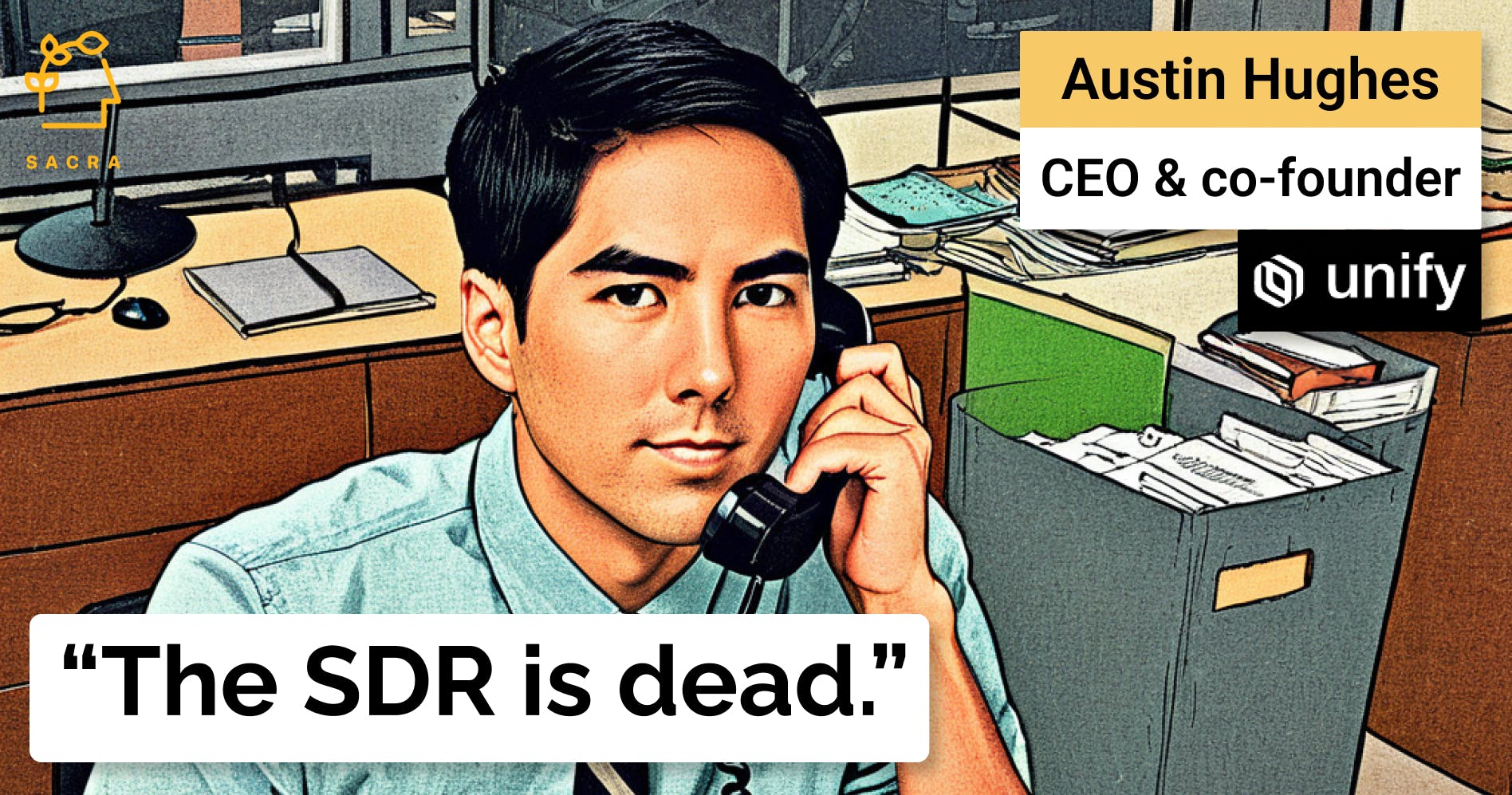
Background
Pete Belknap was one of the first 100 employees at Pilot. We talked to Pete to learn more about the market for tech-enabled services in B2B SaaS, how SMB finance connectors enable and limit tech-enabled bookkeeping, and how Pilot is competitively positioned against companies like Ramp, Gusto, and QuickBooks.
Questions
- You joined Pilot after seven years at Dropbox as an engineer and engineering manager. What made you shift? What opportunity did you see building for the SMB finance stack, which you continued at Invoice2Go and Bill?
- Before Pilot (2016), there was Indinero (2009)—whose business model was overseas labor arbitrage— and Bench (2012). Can you share a brief history of bookkeeping startups and tech-enabled finance back-office services companies? What’s your perspective on how these products have evolved?
- Pilot as tech-enabled services—vs. the previous generation—hinged on the rise of SMB finance connectors like Stripe, Gusto, Expensify, QuickBooks, etc. that enabled bookkeeping to be more “programmable”. Can you talk about the promise of connecting all your services and having it automatically do the books vs. the reality?
- How has what Brex or Ramp are doing in terms of improving categorizations affected Pilot? They're virtual cards and possibly more in the transaction flow, perhaps service better data, get receipts, have a collaborative workflow for approving expenses, enforcing the categorization of expenses as they occur etc.
- Where did Pilot feel the most leverage could be gained from building software vs. which parts of the service needed to be human-driven?
- Was building software for customer experience something that could improve retention by 10x, or have a similar kind of appeal as the telephone?
- Tell us about Pilot’s labor model. Did it employ 100% in-house bookkeepers or were they on contract? Were bookkeepers hired exclusively from lower cost of labor regions of the U.S. or did the company also employ overseas support?
- Services businesses struggle with turnover (plus customer churn as a result) and consistency of customer experience etc. How did Pilot approach solving for those problems—with or without software?
- Today, QuickBooks has become ubiquitous and the core of the SMB finance stack. It makes the books portable so switching costs to another bookkeeping provider is easier. Tell us about the central role that QuickBooks plays. What’s its trajectory look like going forward?
- While Pilot integrates with QuickBooks, Bench has its own proprietary software. What are the relative merits of each approach? Which do you think will win and why?
- Do you think that one of the trade-offs is like, "Hey, we use QuickBooks and that makes it easier for folks to switch off of Pilot onto your the main street bookkeeper," or anybody else? Was that a consideration?
- Can you talk about outgrowing QuickBooks, but also outgrowing Pilot? What break points did you see where a customer might say, "Okay, maybe I'm a little too big for Pilot. Time to get my own in-house controller or work directly with a bookkeeper."
- What’s your take on the rise of AI-powered bookkeeping a la Zeni and Digits? Do you see an opportunity for a 10x reduction in the cost of labor of bookkeeping like with labor arbitrage? Or, can it improve the customer experience 10x with more accurate and reliable categorization?
- Over time, Pilot has added more services like tax, fractional CFO, and R&D tax credits. This cross-sell leverages the fact that the customer has already connected all their services to Pilot and that they will continue to have a single vendor for multiple services. What other increasing returns to scale—if any—do you see for customers to use Pilot for all the services it offers? What additional opportunities are ripe for Pilot to go after?
- In the cross-sell motion, one of the things that you're going up against is that some of these products cross-selling are also integrated into other products that are a part of the customer stack. For example Gusto, which also has R&D tax credits. How do you see the competitive dynamic there?
- Maybe Gusto’s claim to owning the R&D tax credit would be that they are your payroll service, and the R&D tax credit is really a function of your payroll.
- QuickBooks now offers its own bookkeeping services. Pry (before it was acquired by Brex) and even Digits, had bookkeeping services bundled into its FP&A software. Can you talk about the approach of bundling bookkeeping services into other finance back office software as a competitive pressure against Pilot’s approach?
- Has Pilot considered an app store-esque model where you log into Pilot and see a bunch of recommended tools and products, with Pilot monetizing off referral?
- Is there anything else you’d like to add that you think we may have missed?
- If everything goes right for Pilot over the next five years, what do you think it becomes? How will the world be different as a result?
Interview
You joined Pilot after seven years at Dropbox as an engineer and engineering manager. What made you shift? What opportunity did you see building for the SMB finance stack, which you continued at Invoice2Go and Bill?
When I joined Pilot, they had about 100 employees and 20 engineers. I was the second engineering manager. I wanted to go to a smaller company because I felt like a cog; kind of a number where we had more than 100 people that had the same job as me.
While the revenue prospects of Pilot were a fairly minor factor in the choice that I made at that time, what was more important was that I’d worked with all three founders before. I didn't want to take any risk on that, because I know that if the founders are not up to the task, you're not going to have a good time at a startup. So, I approached that with, “Who are the really strong founders that I know?” “Are they doing something that I care about?” I didn't really spend that much time thinking about whether it could make billions of dollars or not.
However, the reason why I cared about what they were doing was, there's just something very basic about bookkeeping—everybody needs it and you're really helping businesses understand where their money's going. The value there really resonated with me.
Before Pilot (2016), there was Indinero (2009)—whose business model was overseas labor arbitrage— and Bench (2012). Can you share a brief history of bookkeeping startups and tech-enabled finance back-office services companies? What’s your perspective on how these products have evolved?
What we all believed internally at Pilot, and what the founders told us all, even though there wasn't a ton of first-hand information was, you could divide this market up.
First, there were the main street bookkeepers—just regular people who do books for companies, people who do the books for themselves. Typically, if you're talking about startups, we've found that the founders do the bookkeeping until it's just too much time doing this. Then, it becomes a third of someone's job at a lot of companies, where you don't have a bookkeeper. That distinction's important because you're not paying somebody full-time just to do only this, but it's one of three hats that they wear.
Second, there were the bigger companies that went, "We do this for lots of people." Pilot acquired a company like that which got us a large number of new customers.
Third, there are these tech startups in a few different categories. One category is almost purely just labor arbitrage. It looks like you're buying tech, but you're really just getting a bookkeeper in the Philippines. They're able to make money on the delta there.
Then, there's another category of tech companies that claim they've built the AI fancy technology that does all this, “Don't you want to get in on this because the AI is great?” It's the new hot technology.
We felt like we were one of the only companies where our value prop was heavily centered around quality. You actually get better bookkeeping results if you have a tech-enabled company doing it, because computers are better at a lot of this than humans. That was a big part of Pilot's value problem.
There's technology that you want to get as the customer—something you can log into and see your books for the past and get some kind of analysis—and my understanding was more or less that's where bookkeeping becomes accounting. That’s when you start to have analysis. It's not just categorization and pure reporting. And that's really what we were trying to do—start with bookkeeping and then grow out from that as a base.
We thought that we were just totally unlike anybody else; that everybody who claimed they had the technology were just lying. Most of the reason why we were automating things under the hood was for our own margins because that was the business we wanted to run. It was because of that value prop that you'll get better results as a customer. It'll be more accurate.
I didn't realize this when I joined, but accuracy is a really big thing. It's not a black and white question. It's not “yes” or “no.” It's a spectrum.
Pilot as tech-enabled services—vs. the previous generation—hinged on the rise of SMB finance connectors like Stripe, Gusto, Expensify, QuickBooks, etc. that enabled bookkeeping to be more “programmable”. Can you talk about the promise of connecting all your services and having it automatically do the books vs. the reality?
There's some part of this that's plumbing. You just need to pull this data together, and that's fairly uninteresting. Sure, the technical problems are fairly hard. You need to solve them. We did some things that we thought were smart, but I don't know that they're truly differentiators.
One of the really big problems is that the financial institutions don't do a good job sharing data. Underneath their hood, their data may be pretty clean but I'm skeptical about that because once you get it, that's where you start to hit all kinds of problems.
Plaid is a really good example. We used Plaid extensively at Pilot. Anybody who worked at Plaid would tell you this is really, really a giant mess that we're trying to clean up and create structure around.
Unfortunately, even though at the end of the day the actual financial transactions that businesses are doing are not all that interesting, it does become kind of a mess. However, my money would be on Plaid being the company that solves that problem, if anybody solves it. They’re a very large business, very competent and if anybody can make the bank data clean, they can do it. The banks may over time also up their game, but that's hard to predict.
Now, Pilot faced a big challenge when dealing with that because a lot of bookkeeping is reconciling two different sources of data against each other. You've got to reconcile transactions against a bank statement, for example. Then, there's this process they call ticking and tying, where you have individual transactions that you have to tie to each other to make sure that no money is created or destroyed inside of the system. You're trying to automate all that, but it's hard because the data is kind of a mess. That was the biggest challenge.
The approach that we were taking while I was there was that automation is a spectrum, it's not a binary so, there's a lot of value you could provide in just creating, for example, a product experience that allows somebody to take an entire a transaction 10x faster than they could do it in QuickBooks. That would be the kind of thing that we'd be trying to build.
How has what Brex or Ramp are doing in terms of improving categorizations affected Pilot? They're virtual cards and possibly more in the transaction flow, perhaps service better data, get receipts, have a collaborative workflow for approving expenses, enforcing the categorization of expenses as they occur etc.
Similarly, if one bank provides better data than another bank, now they can't just get you to switch your bank because it’s not easy to do. But for me as a business owner, what is differentiating banks?
Clean data is one of the bigger factors so, I would certainly be willing to consider switching banks. Pilot's ability to influence what you're using is real because it impacts the cost of doing the books. If you're not willing to adopt the better technology, you're going to be paying more to get your books done.
Where did Pilot feel the most leverage could be gained from building software vs. which parts of the service needed to be human-driven?
Every startup faces some ridiculously hard challenge, and if you're ever looking at a startup and you don't see this, you're just wrong. The one that Pilot really faced was around margins, “How can you make it really, really profitable to do this? Can you automate the whole thing?”
When you’re working on this and could automate something all the way, everything was awesome. But that's not everything. There's a lot of stuff that’s so much work to fully automate and we're just not there, yet. You've got automation, you have to build it in stages. You don't just go all the way to the end in one iteration.
The really, really hard problem was, you can measure the time that humans take to do everything. You set a goal for this quarter, that we're going to spend less time doing this thing than we were before. But the really, really hard thing about this was this feeling—and your data's imperfect—that when we do take time away from something, it kind of reappears somewhere else. My guess is that a lot of that is a human thing.
When we save ourselves time, we often spend it on something else. If I added 30 more minutes onto your day today, you would not be that percentage more productive. Human beings don't really work like that. We're all like that.
The really, really hard thing is, seeing the incremental returns not paying off like you'd expect. If you save five percent of the time it takes to tick and tie a transaction, you don't save five percent of your total time this month to do the books.
Was building software for customer experience something that could improve retention by 10x, or have a similar kind of appeal as the telephone?
The telephone is a really big advantage when you can call a person on the phone. That's a really big deal but it was just a thing that we couldn't deliver, so we had to write that off.
We did a lot around email to get really good at it. But the bet was that we could build a product experience to deliver insights to you, and to make your books just more accessible and easier for you to look at yourself, and where you could see the accuracy. That was the bet—that we could do that better.
We had some really good ideas but the insights were not rocket science kinds of things. I was working on some products that they may have released after I left, so I probably shouldn't go into the specifics because I don't really know what happened there.
But the general contours were like, "Tell me about the stuff that's going on. Tell me about the trends that are starting to happen that are going to become a big deal in the future, and give me some early notice on that."
That problem is pretty tractable, because the core bookkeeping data is really quite simple. At the end of the day it's just like, “What are all the things you spent money on? What are all the ways you made money?” and dividing those into categories that some bookkeeper invented. Doing that kind of analysis is pretty straightforward. You don't need to do any sort of machine learning anywhere.
While we never hit a problem when I was working there, there's probably one problem I could tell you about where machine learning really would be interesting—the categorization problem—where in many cases, there’s not a single right answer to how to categorize a transaction and being able to suggest a category to an analyst to do something around with that. Most of the time you just didn't need to do that. The data and everything was simpler.
Tell us about Pilot’s labor model. Did it employ 100% in-house bookkeepers or were they on contract? Were bookkeepers hired exclusively from lower cost of labor regions of the U.S. or did the company also employ overseas support?
So they had a team of people who were extremely skilled but they weren't typically former bookkeepers. They came from all kinds of different jobs, but they were really good and very smart. Most of them were in Nashville, just for the cheaper cost. We had a small cohort of them in San Francisco who were the original hires that were really scaling out the methodology. We were trying to turn bookkeeping into something that became a little bit more of just a playbook that you follow, and didn't require somebody who was quite as smart to do it. So the folks in San Francisco were really, really incredible and the team in Nashville were all very diligent and good, but less of a huge spike there.
Overall, it worked out pretty well. But that team was still making pretty good money. It's a different kind of a person than you normally see in a fancy tech startup. Their other opportunities were not working for San Francisco tech startups, those folks, but it was not anywhere near a low skilled or unskilled job. I’d imagine they were all still making pretty good money.
Most of the challenges we faced were more just around the, “We are building the product that they're using to do books,” and culturally, they needed more of, "Tell me what to do and I'll do it," kind of product experience than our San Francisco team, who were more, "Build me the power tool. Give me the gun that you can trust me not to shoot myself with."
We had to solve that problem, but that was kind of a product development problem more than anything else. There were interesting problems here around “How does somebody who doesn't know anything about the customer do their books?” That’s because to scale bookkeeping, you do need to be able to solve that problem.
Services businesses struggle with turnover (plus customer churn as a result) and consistency of customer experience etc. How did Pilot approach solving for those problems—with or without software?
I don't think they saw a big correlation between turnover and churn. If you were using Pilot, you did probably like the person who did your books, and you did have more or less usually the same person doing your books.
But the experience that you had was like when you had a question you would write to Pilot. You'd get an answer from anyone. So it was less deeply connected to that person. It was more of a general experience.
The bookkeepers worked really hard to define specifically what is different about each customer, and that would be in the product. If you were going to start doing the books for a customer, the first thing you would look at is there are these 10 things about this customer that's special, and you need to understand this before you start doing the books. Then, the rest of it was all basically the same. Overall, that tended to work pretty well.
We did have one breed of bigger customers, and they were really difficult to manage since they had more of these bespoke aspects to them. There were a couple of customers that people in the office would be like, "We got a problem with so-and-so. It's just a total nightmare." Their expectations would be really high and it would be harder to scale because it's a more complex business. As the businesses became more complex, it became a little harder to scale and those things tended to get routed to a few of your really good people.
I don't know how the company would have managed without having that echelon of just really, really strong bookkeepers around, because there were enough hard problems about, "What do we do for this customer?" that you needed a handful of experts.
Today, QuickBooks has become ubiquitous and the core of the SMB finance stack. It makes the books portable so switching costs to another bookkeeping provider is easier. Tell us about the central role that QuickBooks plays. What’s its trajectory look like going forward?
Do you know about the relationship between Pilot and QuickBooks? Every Pilot customer is using QuickBooks so, Pilot's service and their technology is actually built on top of QuickBooks. As a Pilot customer, you can log into QuickBooks anytime you want to and look at your books. There'd be an agreement over what you should and shouldn't modify so you don't mess with Pilot's processes, but Pilot was actually very tightly coupled to QuickBooks.
That was another differentiator compared to other companies. We thought it was important to be able to tell a customer, "We're not keeping all your bookkeeping data in some proprietary system that's locked down, walled, guarded." But other companies did. Everybody else kept it in some system that you could never access. Not us.
While Pilot integrates with QuickBooks, Bench has its own proprietary software. What are the relative merits of each approach? Which do you think will win and why?
There's a pragmatic technical consideration, which is that you can save yourself from having to solve a lot of technical problems if you just use QuickBooks as your backend. You do create other problems. But I think that on net, that's a pretty clear way.
From the perspective of doing people's books, QuickBooks is not a great product to be running books at scale, because it's really slow. Eventually you would need to be able to run the books fast enough but QuickBooks is slow and too limited in what you can build on top of it. So there is a curve there, and eventually they're going to hit that inflection point. Generally, doing these individual processes that people had to do to process the books was a problem, if your bookkeepers were ever having to log into QuickBooks.
On the other hand, would I want to build my own bookkeeping software from scratch? No. That'd be a big challenge.
Do you think that one of the trade-offs is like, "Hey, we use QuickBooks and that makes it easier for folks to switch off of Pilot onto your the main street bookkeeper," or anybody else? Was that a consideration?
That's a good value prop for a customer, but I think the accessibility is even a bigger deal. Being able to log into QuickBooks yourself as the customer and really get into the weeds of all the data.
It's not a great customer experience to just get a summary of all this data at the end of the month.
But there's other problems. Eventually you outgrow QuickBooks, so what happens then? That's another problem.
Can you talk about outgrowing QuickBooks, but also outgrowing Pilot? What break points did you see where a customer might say, "Okay, maybe I'm a little too big for Pilot. Time to get my own in-house controller or work directly with a bookkeeper."
Outgrowing QuickBooks happens—at some complexity level, everybody moves to NetSuite. Pilot had to solve that problem of how we could support NetSuite.
As far as companies aging out of Pilot, I think it mostly happened for that reason. Like any company, you have churn, and you look at why your churn is happening. But there wasn't something systemic where once our company became so big we would have to leave Pilot. People would churn for all kinds of reasons.
I think one of the things that I came to appreciate was there are a lot of people who really would rather have a main street bookkeeper who they can call on the phone. Not everybody really wants the trade-offs that come with technology, like email support. There's some back and forth. "We need you to log into the system and tell us how to categorize these three transactions." Some customers react to that and they're like, "That's what I'm paying you for." So I think the thing I realized was not everybody wants a bookkeeping technology automation solution thing.
When you have that case I was talking about earlier where you have somebody who works for you and it's a third of their job—now, that's pretty complicated. That's more about selling the product to that person. It's very easy to sell to the startup founder who's currently doing their books and doesn't want to be doing their books anymore. That's one of your easier customers to win.
What’s your take on the rise of AI-powered bookkeeping a la Zeni and Digits? Do you see an opportunity for a 10x reduction in the cost of labor of bookkeeping like with labor arbitrage? Or, can it improve the customer experience 10x with more accurate and reliable categorization?
I haven't thought a whole lot about it. When I was at Pilot, the feeling was very much that we need to automate things, but we don't necessarily need machine learning to do that. It's just literally turn it into a script that you can run that's entirely deterministic. However, there were a few things that I got a real appreciation for working at Pilot.
The first is that bookkeeping is really hard. When I started doing it, I was assuming that it's not really hard, and not really a skill thing. I learned, no, these people are actually really smart.
The other thing I learned was, you really have to be correct.
Just like how a surgeon or a lawyer needs to be doing things the right way, a bookkeeper also needs to do the same. So the threshold that your AI has to cross is very high. The bar is set very high there. It's not like content marketing—that would be very high on my list of jobs that the robots are coming for, because you can literally just plagiarize content that's out there on the internet and give it to someone and call that a product.
Bookkeeping is a lot harder than that to solve with AI, because you need to be able to explain to a customer why this is the right category, why we ticked and tied this transaction to the right other transaction, and the answer to that cannot be, "Because the algorithm said."
The answer has to be based on bookkeeping best practices, which someday, you may be able to do an AI that really understands bookkeeping. When you ask that question, this is the answer you get.
But there will be a lot of skepticism there. Just like if you asked your lawyer a question, you're expecting to get an answer that's grounded in the law. So I'm naturally not super bullish on AI for a lot of things. Bookkeeping is one of the things that I don't think is super close.
Over time, Pilot has added more services like tax, fractional CFO, and R&D tax credits. This cross-sell leverages the fact that the customer has already connected all their services to Pilot and that they will continue to have a single vendor for multiple services. What other increasing returns to scale—if any—do you see for customers to use Pilot for all the services it offers? What additional opportunities are ripe for Pilot to go after?
The tax was an interesting example. When I interviewed the company I was like, "Why are you already doing tax? That's dumb. You should be way more focused on bookkeeping." Their answer was, "Our customers will actually churn if we won't do their taxes, because they just expect to get both of these things from us." I was like, "Okay, that's a good answer."
That's not true of most of the rest of the stuff though that you could think about cross-selling into. Tax is probably a special case and although it might be true for R&D credit, you might expect to get that from the same company that does your taxes.
I think the bigger theme that I personally am a big believer in is, especially all the stuff nobody wants to have to do for themselves and nobody wants to have to think about. You have a good right to win that market if they trust you.
The relationship you have with your bookkeeper, it's like every month you're talking to each other about your business multiple times. They produce an artifact for you at the end of the month that you find to be a useful distillation of your financial metrics. They're doing your taxes for you, you know how important your taxes are. So, that trust that you've built up over time provides a really great springboard for doing lots of other things.
I really believed, and still do, that the market that they're addressing is probably measured in the trillions of dollars because it's like a lot of these financial grunt-work types of things.
With regard to opportunities they should be going after, I don't remember if they were looking at access to capital or not. That would certainly be one. Help me cut costs, I'm sure, is something that they're working on now. Spend, I forget how that worked actually when I was at Pilot but you want your customers to be spending money in a very digital way that's connected well with your books too.
In the cross-sell motion, one of the things that you're going up against is that some of these products cross-selling are also integrated into other products that are a part of the customer stack. For example Gusto, which also has R&D tax credits. How do you see the competitive dynamic there?
I'm a big believer that companies like to buy things from fewer vendors. All things being equal, if they already buy things from you and they need to buy the next thing, they'd rather buy it from you or one of their other vendors than start a relationship with a new vendor.
Then, the question is, why should I get my R&D tax credit from Pilot when I could get it from Gusto? The way we thought about that at Pilot was that, it'd be about your relationship. As a dumb example, Google is probably somebody you would not go to get your R&D tax credit from, even if they offered it because you would be like, "Why should I believe Google will do a good job of that?"
I assume that Gusto's in-rows is payroll-oriented, and Pilot's is tax-oriented. So it's like, do I believe that someone will be more likely to buy R&D credit from their tax professional than from their payroll company? I do, but I'm biased.
Maybe Gusto’s claim to owning the R&D tax credit would be that they are your payroll service, and the R&D tax credit is really a function of your payroll.
I'm actually not an expert on it, but I don't think it’s as simple as how many software engineers you employ. It’s also about what they're working on, so it's in part about categorizing the hours your engineers are spending. And then I think how much you can claim depends on other qualities of your business. It’s not just a matter of having X engineers on payroll and therefore your R&D credit is Y. But I could be wrong about that.
QuickBooks now offers its own bookkeeping services. Pry (before it was acquired by Brex) and even Digits, had bookkeeping services bundled into its FP&A software. Can you talk about the approach of bundling bookkeeping services into other finance back office software as a competitive pressure against Pilot’s approach?
Pilot's model is basically, “If you don't want to do your own bookkeeping, pay us and we'll take care of all this shit for you.”
Intuit's model is you should do your own bookkeeping, but you might need help, and we're going to give you a really easy way to get help.
Those are the two that I'm the most familiar with. The way I look at it is, it's really a question of do you want to do your own books or not?
Has Pilot considered an app store-esque model where you log into Pilot and see a bunch of recommended tools and products, with Pilot monetizing off referral?
Honestly, I would assume they already do get some level of monetization when they're recruiting customers into services. I don't know if there's a better way to get more. It makes sense in principle.
It's when you sign up for Pilot, by the way, you go through an onboarding process and they make sure that everything you're doing is amenable to their service. So that's the moment when they tell you, "You need to use this, you need to use that."
Is there anything else you’d like to add that you think we may have missed?
You need really good engineers, product managers, and designers to do a service like this, because you're trying to build a product that really makes people more productive.
Everybody loves to talk about productivity tools, but Pilot's a business where time literally is money. It was very different from Dropbox. You're literally trying to save minutes of the day because that translates to dollars.
On the engineering side, you really need to take good care of this customer data, because it's their money and their business.
On the product side, it is really hard to know what to build. It is not as easy and nothing like doing that at a lot of other companies. When you're doing that at Bill, you're just like, "How do we want to make more money? Okay, cool. We need to offer something in this space. What do the customer problems look like? What does a decent product look like?"
Pilot's nothing like that. It's like, "How could we make it 10 minutes faster to tick and tie transactions?" So I think that a lot of companies trying to do this kind of thing will probably fail if they don't have a talented team. There's a big spectrum there with companies and a lot of companies where you just don't need a high talent bar as much.
If everything goes right for Pilot over the next five years, what do you think it becomes? How will the world be different as a result?
If there's some sort of category of companies where they can really automate, let's say, 99% of the bookkeeping, then, they're going to have an amazing margin, and those customers are going to be super happy because they're just going to get their books, no drama. They'll get them early, rather than on the last day of the month, and they can dig into the QuickBooks if they want, but they also get this product that Pilot ships them, that gives them some easier way to get a basic idea and get some insights around their business. There, you get a really profitable business with really happy customers, and a lot of bookkeepers in the world probably lose their job.
The Pilot-takes-over-the-world scenario is where they automate more and more and more of it. What I mean there is, you automate 99% of it for some shape of business, let's say, a tech startup with fewer than 20 employees. I don't know what shape it is but to me, that's one of the horizons where they really take off. From there you grow, you sell more services to people and that just gets you more revenue.
But I don't know that it changes the world in some way where things are really different. I think you've just taken one of the annoying parts of running a business and you've made it less annoying, but not insignificant.
Disclaimers
This transcript is for information purposes only and does not constitute advice of any type or trade recommendation and should not form the basis of any investment decision. Sacra accepts no liability for the transcript or for any errors, omissions or inaccuracies in respect of it. The views of the experts expressed in the transcript are those of the experts and they are not endorsed by, nor do they represent the opinion of Sacra. Sacra reserves all copyright, intellectual property rights in the transcript. Any modification, copying, displaying, distributing, transmitting, publishing, licensing, creating derivative works from, or selling any transcript is strictly prohibited.

 Walter Chen
Walter Chen

















